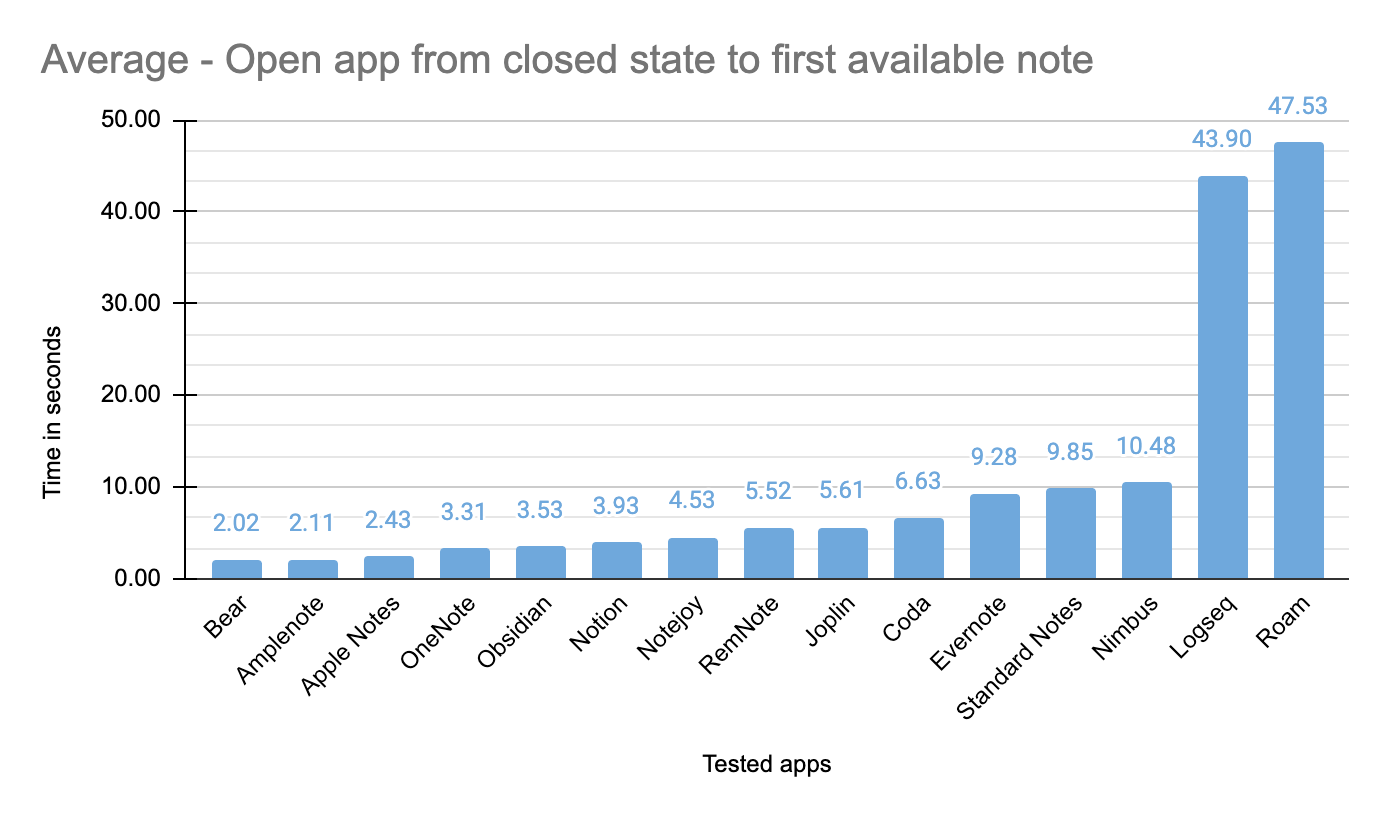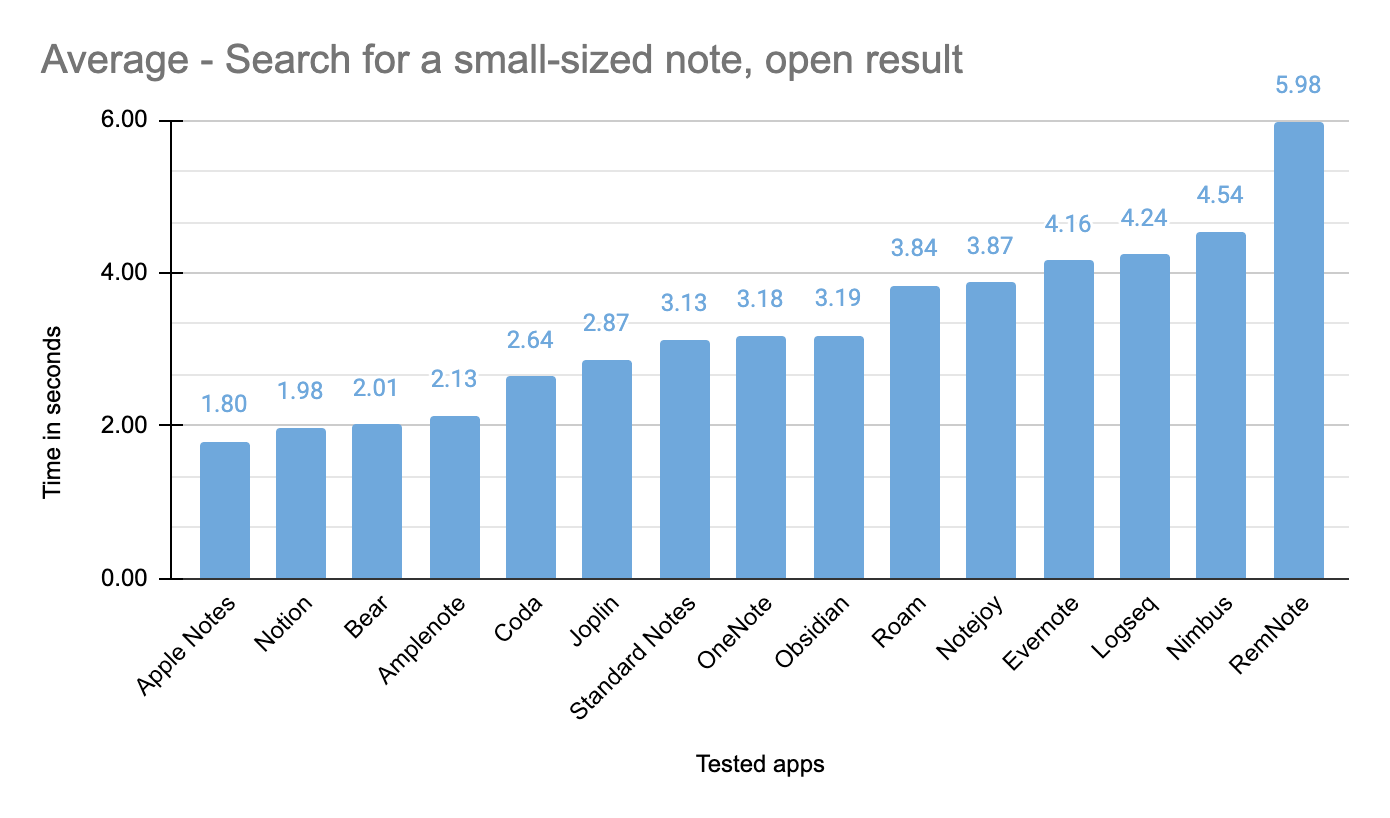📖 Also read: How we ran these tests.
Change log:February 14th, 2022: Added results for Logseq and Remnote
linkTable of Contents
linkMotivation
At the time we're publishing this research in June 2021, we have indexed 22 note-taking apps across 270 features in 17 feature domains, which, to the best of our knowledge, makes NoteApps.info the most comprehensive feature database for note-taking/task-managing apps on the Internet currently.
But looking at what productivity aficionados on the Internet have to say about their note-taking app of choice, we've realized very early into this project that how an app performs is almost just as important as how many features it has.
link🚀 Enter performance benchmarking!
While designing the most practical tests to perform for each app, we've come up with five common user scenarios, based on what people appear to criticize most often about their tool of choice. For each of these tests, we've examined all available clients the app provides and calculated the average of 3 consecutive tests, to account for the human variable.

Here is a useful link if you want to read all the details of How we ran these tests, where we go into much more detail about the methods and testing environments.
At the time of writing, the list of apps we tested for performance is the following:
Amplenote
Apple Notes
Bear
Evernote
Joplin
Logseq
Nimbus
Notejoy
Notion
Obsidian
OneNote
Remnote
Roam Research
Standard Notes
linkThe individual tests
This section of the article outlines the benchmarking results of each app for the individual tests we designed. The displayed results are obtained by averaging the results of each test performed across all available platforms.
If instead, you're interested in how these apps are ranking on each platform, jump to Per-platform Average Results. If you want to skip forward to the overall performance across all platforms, jump to Fastest Overall Applications.
linkTest #1: App load times
This test measures how long it takes for each app to display the first available note after starting the app from a completely closed state.
This test is likely the one that is most affected by the number of notes that have to be loaded into the app's memory. For each of the tested apps, we've imported 2000 notes of variable size and including pictures, in order to emulate a reasonably realistic user experience.
The segments in the chart below represent the computed average of all of the individual platforms that the app provides.
Average times computed for all provided platforms for opening an app from a completely closed state to the first available note.
Smaller segments = better performance
🐰 The notable winners for this test, scoring sub-three-second times on average for opening the app on each respective platform:
Bear - average of 2.02 seconds
Amplenote - average of 2.11 seconds
Apple Notes - average of 2.43 seconds
🐌 The slowest entries on the list are:
Roam Research - average of 47.53 seconds
Logseq - average of 43.90
Nimbus Note - average of 10.48 seconds
Standard Notes - average of 9.85 seconds
Evernote - average of 9.28 seconds
link⚠️ Slower app considerations
Note that some of these results reflect app loading speeds, while others are a result of trade-offs for unique feature sets:
Standard Notes is currently (June 2021) the only app we're indexing that implements client-side encryption as well as encrypting all notes locally. When considering the test results, bear in mind that Standard Notes is the only app that also has to decrypt all (or most) of the 2000 notes we've imported before starting up the app.
Roam Research is, as far as we know, the only app we're indexing that holds internal references to every individual block from each imported note. Roam's results should be regarded partly as a consequence of the backend ramifications of the block-centric model, with all its advantages. Read more on Plausible models for block-based apps.
Update February 14th, 2022: We have not confirmed this fact, but we think Logseq is now the second app to be featured in this article that also implements a block-level model in the backend.
linkTest #2: Searching across all notes
In this test, we timed how long it takes for a user to bring up the search field, enter a word and navigate to the note containing the first search result. In a similar fashion to all the other tests we performed, for each platform, we've computed the average of 3 runs, which we think should help minimize the variability introduced by typing speed and other UX considerations.
Average times computed for all provided platforms for searching for a word and opening the first search result
Smaller segments = better performance
Compared to Test #1: App load times, this test has a much smaller standard deviation, with all or most of the results hanging around the two-to-four-second area.
🐰 Among the fastest entries are:
Apple Notes - average of 2.06 seconds
Bear - average of 2.15 seconds
🐌 At the slower end of the chart are:
RemNote - average of 6.01 seconds
Logseq - average of 5.25 seconds
Nimbus Note - average of 4.17 seconds
linkTests #3 and #4: Searching for small & large notes
This test measures how fast each app can bring up a search menu, find a specific note by title and open it. Out of the generated notes, we picked two representative examples: one for a typically small note and one for a typically large note.
Average times computed for all provided platforms for searching for a small-sized note by title and opening it
Smaller segments = better performance
Average times computed for all provided platforms for searching for a large-sized note by title and opening it
Smaller segments = better performance
🐰 Fastest candidates:
Apple Notes - average of 1.94 seconds
Amplenote - average of 2.25 seconds
🐌 Slowest candidates:
Nimbus Note - average of 4.86 seconds
linkTest #5: Creating a quick task
Test number 5 is a compound one, measuring how long it takes to open the app from a completely closed state and create a one-word task via the fastest available mechanism.
Smaller segments = better performance
🐰 Winners in this category include:
Amplenote - average of 4.25 seconds
Apple Notes - average of 4.30 seconds
Bear - average of 4.74 seconds
🐌 The slowest apps in this test were:
Roam Research - average of 50.11 seconds
Logseq - average of 49.42 seconds
RemNote - average of 14.67 seconds
Nimbus Note- average of 13.15 seconds
Standard Notes - average of 13.03 seconds
Evernote - average of 10.79 seconds
Make sure to read about app load time factors: ⚠️ Slower app considerations .
linkPer-platform Average Results
Charts in this section outline how the tested apps performed on the individual platforms they offer a client for. Numbers shown on the charts are obtained by adding up each apps' results on The individual tests.
Smaller segments = better performance
Apps with the fastest web clients include:
Notejoy - total of 10.40 seconds
Amplenote - total of 11.93 seconds
Notion - total of 15.08 seconds
Smaller segments = better performance
Apps with the fastest macOS clients include:
Apple Notes - total of 10.93 seconds
Obsidian - total of 12.89 seconds
Bear - total of 13.91 seconds
Smaller segments = better performance
Apps that offer the fastest Windows clients are:
OneNote - total of 17.92 seconds
Obsidian - total of 19.74 seconds
Smaller segments = better performance
Fastest Android apps include:
OneNote - total of 14.84 seconds
Amplenote - total of 14.95 seconds
Joplin - total of 16.65 seconds
Smaller segments = better performance
Fastest iOS apps were:
Bear - total of 12.55 seconds
Apple Notes - total of 14.37 seconds
Amplenote - total of 14.81 seconds
Notion - total of 15.22 seconds
linkFastest Overall Applications
Displayed times are computed averages for the 5 platforms mentioned above (Per-platform Average Results).
Smaller segments = better performance
🚀 Fastest apps on average were:
Apple Notes - average of 12.65 seconds
Bear - average of 13.23 seconds
Amplenote - average of 13.90 seconds
Notion - average of 19.12 seconds
🐢 Slowest entries on average include:
Roam Research - average of 109.1 seconds
Logseq - average of 107.43 seconds
Remnote - average of 37.56 seconds
Nimbus Notes - average of 37.52 seconds
Read more about ⚠️ Slower app considerations .










